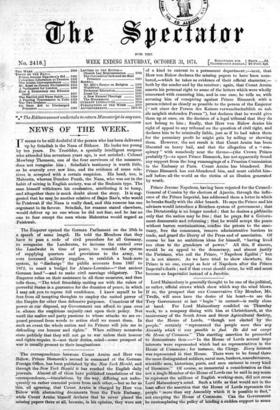The correspondence between Count Arnim and Herr von Billow, Prince
Bismarck's second in command at the German Foreign Office, has been published by the New York Herald, and through the New York litrald it has reached the English daily journals. Almost all of them have published translations of the correspondence,—translations, by the way, differing not unfre- quently on rather essential points from each other,—but so far as this, all agreeing, that Count Arnim is charged by Herr von Billow with abstracting documents from the Paris Embassy, while Count Arnim himself declares that he never placed the missing papers there at all, because, in his opinion, they were not of a kind to entrust to a permanent department ;—next, that Herr von Billow declares the missing papers to have been num- bered,—which he takes as evidence of their official character,— both by the sender and by the receiver ; again, that Count Arnim asserts his personal right to some of the letters Which were wholly concerned with censuring him, and in one case, he tells us, with accusing him of conspiring against Prince Bismarck with 'a person related as closely as possible to the person of the Emperor (" mit einer der 'Person des Kaisers verwandtschaftlich so nah als moglich stehenden Person"), but declares that he would give them up at once, on the decision of -a legal tribunal that they do not belong to him ; finally, that Herr von Billow denies his right of appeal to any tribunal on the question of civil right, and declares him to be criminally liable, just as if he had taken them for the pecuniary profit he might gain by selling or showing them. However, the net result is that Count Arnim has been liberated on heavy bail, and that the allegation of a " con- spiracy " with somebody near the throne—(the Crown Prince probably 2)—to upset Prince Bismarck, has not apparently found any support from the long rummagings of a Prussian Commission in the Embassy at Paris. Count Arnim has blundered. But Prince Bismarck has out-blundered him, and must exhibit him- self before all the world as the victim of an illusion generated by wrath.






































